|
Diptera larva in nest of Lasius fuliginosus
|
|
| Krister Hall |
Posted on 27-08-2008 19:16
|
|
Member Location: Posts: 42 Joined: 28.07.07 |
Hi! I found about 100 or so of this diptera larva in Lasius fuliginosus-nest. Anyone who knows what it can be? |
|
|
|
| conopid |
Posted on 27-08-2008 19:50
|
|
Member Location: Posts: 1039 Joined: 02.07.04 |
I think this might be Syrphidae - Microdon or Volucella species? Whatever they are, nice find! 
Edited by conopid on 27-08-2008 19:51 Nigel Jones, Shrewsbury, United Kingdom |
|
|
|
| Krister Hall |
Posted on 27-08-2008 21:07
|
|
Member Location: Posts: 42 Joined: 28.07.07 |
Thank you for your reply Nigel! When I read the Graham E. Rothary Colour guide to Hoverfly Larva it says that all Syrphid larvaes have fused posterior breathing tubes in all stages except for the homopteran predators that have separate tubes in stage one and two. Could he be wrong? |
|
|
|
| Tony Irwin |
Posted on 28-08-2008 00:30
|
|
Member Location: Posts: 7168 Joined: 19.11.04 |
It is possible that this is the very young Microdon larva - showing segmentation and separate posterior spiracles, but it reminds me more of a Lonchoptera larva. The fully-grown Lonchoptera larvae should be much smaller than the fully-grown Microdon larvae, and should have long anterior and posterior processes, but perhaps not in young larvae. How big were these? And I hope you will be able to re-visit the nest when the larvae have grown - and hopefully to collect some pupae to rear, so we can be sure what these are! As Nigel says - a nice find! 
Tony ---------- Tony Irwin |
|
|
|
| Krister Hall |
Posted on 28-08-2008 06:53
|
|
Member Location: Posts: 42 Joined: 28.07.07 |
Thank you Tony! The larvaes are aprox. 4-5mm long. My (limited) experience with syrphid larvaes is that they look very much the same when they are small as when they are bigger. I colllected them two weeks ago and tried to rear them but they died. I guess they really depend on the the host ants. I will re-visit and look for larger larvaes and pupae. Edited by Krister Hall on 28-08-2008 06:56 |
|
|
|
| Tony Irwin |
Posted on 01-09-2008 16:22
|
|
Member Location: Posts: 7168 Joined: 19.11.04 |
I've been puzzling over this, and have come to the conclusion that it may not be a Diptera larva! - I think it may be an early instar lycaenid butterfly caterpillar. Can you re-post it on a butterfly forum to see if anyone recognises it there?
Tony ---------- Tony Irwin |
|
|
|
| Krister Hall |
Posted on 05-09-2008 19:16
|
|
Member Location: Posts: 42 Joined: 28.07.07 |
Thank you again for your reply Tony! I am quite convinced that this is a diptera larvae, I had the luxury of seeing it moving. It does not look like a lycanidae(i have made that misstaces before in this forum). But as stated before I will go back and look for pupae....and post the result here. |
|
|
|
| Tony Irwin |
Posted on 05-09-2008 22:08
|
|
Member Location: Posts: 7168 Joined: 19.11.04 |
Well, here's my prediction - this will prove to be the much-searched-for larva of Opetia! From the photo it looks to be somewhere between Lonchopteridae and Platypezidae. I do hope you can re-find the larvae and manage to rear some. Please make a point of preserving some in alcohol too - they could be quite important!
Tony ---------- Tony Irwin |
|
|
|
| Tony Irwin |
Posted on 11-09-2008 00:37
|
|
Member Location: Posts: 7168 Joined: 19.11.04 |
Prediction withdrawn!! I was talking to Peter Chandler yesterday and he suggested that Milichiidae might be the answer - Milichia ludens has been recorded as breeding in Lasius fuliginosus nests, although the immature stages have not been described. Checking up on Irina Brake's excellent Milichiidae site - she has an image of a non-European species which must have a very similar shaped larva (judging from the shape of the puparia - see http://milichiida...o-my-p1jpg). I've contacted Irina and suggested that she look at this thread - hopefully she may know the species, or at least confirm that it is a milichiid. Edited by Tony Irwin on 11-09-2008 00:39 Tony ---------- Tony Irwin |
|
|
|
| ibrake |
Posted on 11-09-2008 08:52
|
|
Member Location: Posts: 64 Joined: 03.03.08 |
Thanks for drawing my attention to this, Tony, but I am afraid I can't solve the mystery. I have not studied Milichiidae larvae in detail, yet. You are right, the larva looks similar to Costalima myrmecophila, but Costalima is not closely related to Milichia ludens. It is more closely related to Phyllomyza, of which several species have been reared from Lasius nests. However, the puparia known from two Phyllomyza species look 'normal'. So, the best would be to rear the larvae to get some adults and to put a few larvae in alcohol to study them. |
|
|
|
| Paul Beuk |
Posted on 14-11-2013 11:12
|
|
Super Administrator Location: Posts: 19208 Joined: 11.05.04 |
Did you rear any larvae?
Paul - - - - Paul Beuk on https://diptera.info |
|
|
|
| ChrisR |
Posted on 14-11-2013 11:49
|
|
Administrator Location: Posts: 7699 Joined: 12.07.04 |
Might be worth showing this to Judy Webb, as she was doing some work locally to me on Milichiidae associated with Lasius fuliginosus as few years ago. She rears larvae when she finds them and might have come across these before. I will pass a link on to her. EDIT: I have spoke to Judy and she caught adults from around the nests but wasn't able to get into the nests before they were destroyed by vandals. She will watch this thread with interest. Edited by ChrisR on 14-11-2013 15:20 Manager of the UK Species Inventory in the Angela Marmont Centre for UK Biodiversity at the Natural History Museum, London. |
|
|
|
| Jump to Forum: |


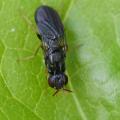



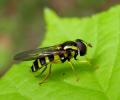
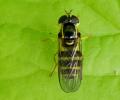

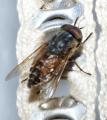
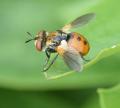



 but don't see the image in the post.
but don't see the image in the post.